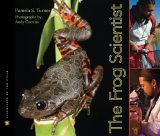Two Announcements:
Don't forget to give me all your challenge info for The Reading Challenge Clearinghouse.
Last Tuesday, I ordered a bunch of Diary of a Chav books from The Book Depository. Two of them arrived today! I bet the rest will come tomorrow! (Each book was shipped separately.) Not bad for free international shipping! (Seriously, not affiliated at all, except that I love them because of their awesomeness.)
And now, for your Monday non-fiction-y goodness:
The Frog Scientist Pamela S. Turner
Ok, I'm putting the full disclaimer information up on top for this one, because it may look a little suspect. Usually, I don't review books that are under 100 pages on this blog, just because I have to draw the line SOMEWHERE (just like I don't review audio books here, I have to get some semblance of control.) However, I occasionally make an exception if there is a book that I want to talk about or if the content level is bigger than the 100-page length.
I went back and forth a little bit when Turner offered me this book to review (so, to spell that out, this copy was provided by the publisher) because I knew it was under 100 pages. BUT! I also knew that the Scientists in the Field series was awesome and a great series to give to kids. (I mean, the cover alone on The Bug Scientists will sell it.) So, I decided to review it. I just wanted to let you know what was going on up front.
This story follows an experiment in Dr. Tyrone Hayes's lab at UC Berkeley, where he's studying the link between the pesticide atrazine and the femalization of male leopard frogs. Along the way, we get Dr. Hayes's life story (with some awesome pictures from his college days at Harvard in the 80s--seriously awesome New Wave hair) we meet his family and the students working in his lab and why they're interested. Many are interested in biology and science and want to continue working in the field, but one was the child of migrant workers and was more interested in how the pesticide effects people who breathe it in everyday while working in the fields.
The book focused a lot on pesticide risks to frogs, because that's where Hayes's research is, but did talk about other things effecting frogs and other variables in the puzzle, and it also talked about why we should care.
Lots of big pictures of frogs (and frog dissection) as well as daily lab life illustrate the text and make it an easy hand-sell. I really liked the fact that the lab was full of women and people of color doing science, but I kinda wondered where the guys were. I also liked how the reader gets to see how lab science really works (let's do this experiment over and over again to make sure our results are consistent! Now! To wash the test tubes!)
I like this entire series and this is a good addition.
Round-up is at MotherReader!



No comments:
Post a Comment